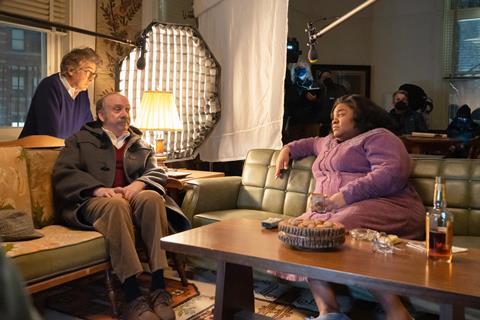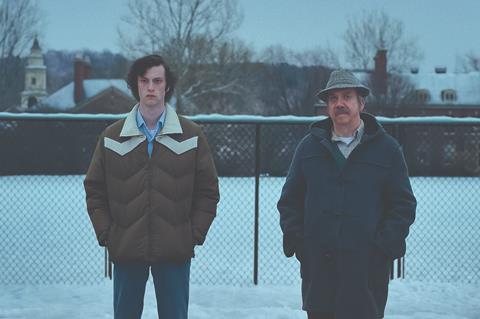Writer/director Alexander Payne talks about delving into the 1970s with The Holdovers

For a writer/director who has won two Academy Awards for his screenplays (Sideways with co-writer Jim Taylor and The Descendants with Nat Faxon and Jim Rash), Alexander Payne has an unexpected view on writing. “That’s the part of filmmaking I’m least interested in,” he reveals to Screen International during the BFI London Film Festival. “I’m more interested in the acts of directing and editing. I write for myself out of desperation — I open every script I’m offered with a prayer, ‘Please God, please make me want to direct this so I don’t have to write!’”
Payne’s latest film The Holdovers, a poignant coming-of-age tale set in a New England prep school over the 1970 Christmas holidays, is only the second, after 2013’s Nebraska, for which he has no writing credit. Although, “That project came to me as a script, pretty fully formed,” he points out. “But this is one that I originated.”
The Holdovers started as a notion suggested by 1935 French film Merlusse. It provided a promising premise, concerning an unpopular teacher with a glass eye and a piscine odour who must oversee a group of schoolboys over the Christmas holidays. Payne, however, did not feel capable of turning that basis into a story. “I had neither the discipline nor the life experience to properly attack the screenplay,” he says.
Serendipitously, writer David Hemingson — a TV scribe, director and producer known for shows such as Whiskey Cavalier and Black-ish — came to Payne with a pilot script that takes place in a boarding school. “I rang him up and said, ‘I like your pilot. I don’t want to make it, but would you consider writing something I give you in that same world?’” recalls Payne. “He agreed, and we hashed out the story together — meaning he came up with different premises, which I either accepted or shot down. It was my first experience, really, of directing a writer.”
That is an intriguing way to describe the process, but as an interviewee (and as a director, for that matter), Payne always keeps things interesting. He clearly does not treat his publicity duties as an onerous Q&A exercise, rather as a conversation. And it has been a while since he has done this — five years since his last movie Downsizing, the ambitious sci-fi satire in which Payne shrank Matt Damon, “tanked so bad” at the box office.
Despite Downsizing’s disappointing performance, however, Payne has not been in filmmaking exile. In 2019 he was about to direct a “very lovely” feature for Netflix starring Mads Mikkelsen — “[as] a Dane taking a road trip with his daughter in the US” — when it suddenly collapsed. “We had to pull the plug about five days before production started.” (Owing, it seems, to a rights issue.) Then, of course, the pandemic hit.
Leading lights

After premiering at Telluride, The Holdovers was released in the US in November, grossing $15.1m for Focus Features at press time, and opens in the UK in January via Universal. It should perhaps be celebrated not so much as a return for Payne, but as a long-awaited reunion with his Sideways lead actor Paul Giamatti… a reunion the director admits took too long coming.
“I’m slow with scripts. I’m not Mr Speedy with the old Scribo,” he laughs. “But I was always thinking about him. He wasn’t right for The Descendants [which starred George Clooney], and there was nothing for him in Nebraska.” In fact, Payne had originally wanted Giamatti to lead Downsizing but, by the time he came to make it, that was not possible. “Then finally I got around to getting him again. I told Hemingson, ‘We’re writing this part for Paul Giamatti.’ Indeed, the character is named Paul.”
Inheriting the glass eye and fishy scent from Merlusse, Giamatti’s Paul Hunham is an acerbic curmudgeon, trapped in a teaching job for which he has little love. As in Sideways, Giamatti brings warmth and sympavopidsathy to an initially prickly character. But, says Payne, “Paul’s right for anything in my book. Whatever he does, he makes it infinitely watchable. And because I like a nice hefty tone — comedy and drama and everything in between altogether — he can embody that. He can do dramatic things with comic panache, and he can do comic things with utter seriousness and conviction. He’s the right guy for me. And funny as hell. It’s delightful to be with him.”
Sharing the screen with Giamatti are Da’Vine Joy Randolph, who similarly balances pathos and laughs as the school’s grieving cook (“I saw her in Dolemite Is My Name, which is a great movie, underseen, underappreciated”) and a true discovery in Dominic Sessa, who has never previously acted on screen, as troubled schoolkid Angus Tully. While fielding 800 submissions for the role during casting, Payne suggested canvassing the drama departments of the five schools he was using as locations — “You know, for a one-line or two-line part. But, damn, if we didn’t find the lead at Deerfield Academy. There he was!”
Sessa, he says, “is born to do this. When you’re dealing with someone with no experience, you have to have him or her return many times to audition to see how bulletproof they are. And he proved himself increasingly to be bulletproof.
“There were a couple of also-rans,” he adds, “but this one had the face that you wanted to see saved by the story of the film. And the fucker has acting talent.” It also helped, Payne adds, that “he had the right haircut. Thank God long hair is back.”
Time travel
The Holdovers is notably Payne’s first period film. The 1970-71 setting feels appropriate, given his movies have always had a ’70s vibe to them. But it was not enough for Payne to merely set the film in the ’70s. “I thought, ‘Wouldn’t it be groovy to try to pull off the parlour trick of making it look and sound as though it had actually been made in 1970? That would be a fun challenge.’”
And was it? “Super-fun! Mostly because I got to time travel. There are two decades in which I have fantasised about being a director. I would have liked to do comedy in the 1920s, and also be an American filmmaker in the 1970s, because that’s when I was a teenager. And I think it paid off creatively, because with too many period films, you’re looking at it rather than being it. They fall into a trap of over-fucking-doing the production design. ‘Look how period it is!’ No. Things are banal. So let’s capture the banality we would have captured as low-budget filmmakers back then.”
Intriguingly, this may not be Payne’s last time-travelling experiment. “In Hemingson I’ve finally found a partner who shares my zeal to make a western,” he reveals. “So we’re conceiving a western.” But that is not the only potential next project Payne has “on the stove”, he says — a sequel to 1999 high school-set political satire Election, which starred Reese Witherspoon and Matthew Broderick, is floating around. “[Writer] Jim Taylor and I are starting to talk about that. And there’s a project that would take place in Paris, France and in the French language.”
Despite the fact he once worked on the script for Jurassic Park III, Payne says he has never been offered any big studio director-for-hire gigs. But, he insists, with one final unexpected statement, “I wish they’d think of me. One of my prayers with this movie is that it gets out there a little bit and somebody thinks, ‘Oh, Payne might be right for this script.’”
As he says, he really does not love the writing. “Come take me away from all this, take me away from la page blanche!”






![The Brightest SunScreen[Courtesy HKIFF]](https://d1nslcd7m2225b.cloudfront.net/Pictures/274x183/3/5/0/1448350_thebrightestsunscreencourtesyhkiff_312678.jpg)


















No comments yet